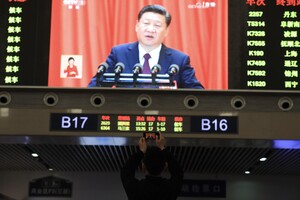The Chinese leader said Beijing would continue to “oppose Taiwan's independence” and strengthen the military's strategic capabilities.

Chinese leader Xi Jinping opened the XX congress of the Chinese Communist Party — an event where he is likely to be re-elected to a third five-year term and cement his role as the country's most powerful ruler since Mao Zedong, writes The Guardian.
In his speech, Xi Jinping emphasized that the party guarantees national security, supports social stability, protects people's lives and takes control of the situation in Hong Kong, where anti-government protests took place in 2019. Beijing has introduced a large-scale law on national security in this territory.
The Chinese leader also mentioned Taiwan.
“We are resolutely waging a great struggle against separatism and interference, demonstrating our firm determination and ability to protect state sovereignty and territorial integrity and oppose Taiwan's independence,” he declared.
The delegates present responded with loud applause.
Xi Jinping said that Beijing will never give up the right to use force, but will seek a peaceful settlement of the Taiwan issue, adding that “the country's complete reunification must and will be achieved.”
Xi Jinping also said in his speech that China will strengthen the strategic capabilities of the armed forces to protect sovereignty.
“China will accelerate the development of world-class armed forces and strengthen its ability to create strategic deterrence potential,” he emphasized.
p>
Xi said the party, which has 96 million members, “has won the biggest battle against poverty in human history”.
The convention of some 2,300 delegates from across the country began in the Great Hall of the People in Tiananmen Square amid heightened security.
During his decade in power, Xi, 69, has steered China down an increasingly authoritarian path that puts the first place is security, state control over the economy in the name of “general prosperity”, more persistent diplomacy, a stronger army and increased pressure to seize Taiwan.
Analysts do not expect any significant changes in the country's political course.< /p>
In particular, in recent days, China has repeatedly emphasized its commitment to Xi Jinping's “zero covid” strategy, dashing the hopes of the country's residents, as well as investors, that Beijing may soon begin to move away from a policy that has caused widespread disappointment and economic damage.
Xi's rule appears to have been unscathed during a difficult year in which the country's economy slowed sharply due to frequent lockdowns and a crisis in the real estate sector.
However, China's relations with the West have deteriorated sharply, as Beijing has not condemned the Russian invasion of Ukraine.
In 2018, Xi lifted presidential term limits, paving the way for a third five-year term or more.
Also read: Senior NATO official spat with Chinese diplomat over Russia's war against Ukraine
The congress, held twice a decade, is expected to confirm Xi as party secretary general, the most influential position in China, as well as the chairman of the Central Military Commission. Xi's presidential powers should be renewed in March at the annual session of China's parliament.
Related video
Ahead of the congress, Beijing has tightened security measures and coronavirus restrictions. After the congress, Xi is expected to unveil his new Politburo Standing Committee, a seven-person steering group.
See Special Topic: US-China Confrontation Senior official NATO entered into a dispute with a Chinese diplomat over Russia's war against UkraineTension flared at the conference in Iceland. Representatives of the US Congress arrived on a visit to Taiwan In particular, American lawmakers plan to meet with the president of the island. The US will continue to strengthen “informal ties” with Taiwan – Vice President Kamala Harris Harris criticized Beijing for pressuring its neighbors. US lawmakers step up pressure on big banks over ties to China and Taiwan – Reuters Also in the US, pressure is now on defense companies to get rid of any what dependence on Chinese materials for the manufacture of weapons. Pentagon forces defense companies to limit use of Chinese supplies – WSJ The discovery of Chinese-made alloys in F-35 jets has put US officials on alert as they try to limit vulnerabilities in the context of China.




